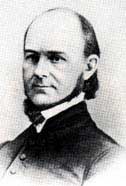Readings:
Numbers 21:4-9
Psalm 145
1
Corinthians 3:1-7
John 18:33-37
Preface of Pentecost
[Common of a Missionary]
[Common of a Pastor]
[For the Ministry II]
[For the Mission of the Church]
[For Education]
PRAYER (traditional language)
O God, who sent thy Son to preach peace to those who are far off and to those who are near: call us from comfortable complacency to preach, teach, and plant thy church on new frontiers, after the example of thy servant James Lloyd Breck; through Jesus Christ our Lord, who liveth and reigneth with thee and the Holy Ghost, one God, for
ever and ever. Amen.
PRAYER (contemporary language)
O God, who sent your Son to preach peace to those who are far off and to those who are near: call us from comfortable complacency to preach, teach, and plant your church on new frontiers, after the example of your servant James Lloyd Breck; through Jesus Christ our Lord, who liveth and reigneth with thee and the Holy Spirit, one God, for ever and ever. Amen.
Lessons revised at General Convention 2024.
Return to Lectionary Home Page
Webmaster: Charles Wohlers
Last updated: 1 Feb. 2025
JAMES LLOYD BRECK
Priest, Educator, and Missionary (2 April
1876)
 Breck was born 27 June 1818 near Philadelphia, and attended high school
at the Flushing Institute, founded by William Augustus Muhlenberg (see
8 April), who inspired him to resolve at the age of sixteen to devote
himself to missionary activity. In 1844, by then a priest, he went to Wisconsin
(then on the frontier) with two classmates, under the direction of Bishop
Kemper, to found Nashotah House, intended as a monastic community, a
seminary, and a center for theological work. It continues today as
a seminary and representative of one traditional aspect of Anglican thought
and practice.
Breck was born 27 June 1818 near Philadelphia, and attended high school
at the Flushing Institute, founded by William Augustus Muhlenberg (see
8 April), who inspired him to resolve at the age of sixteen to devote
himself to missionary activity. In 1844, by then a priest, he went to Wisconsin
(then on the frontier) with two classmates, under the direction of Bishop
Kemper, to found Nashotah House, intended as a monastic community, a
seminary, and a center for theological work. It continues today as
a seminary and representative of one traditional aspect of Anglican thought
and practice.
In a letter to a friend, Breck described the seminary in his day as follows:
- The students boarding with us are all theological. They
are chiefly young men, sons of the farmers, and all communicants of the
Church. Our students, like ourselves, are poor, but not the less worthy
for all that. They seek the Ministry, but are unable to attain it without
aid. We have a house; for this we pay no rent; it belongs to the Church,
and so do we. We have land. They work four hours a day for their board
and washing, and we give them their education without cost. Thus their
clothing is their only expense, and to enable them to purchase this, we
give them six weeks vacation during the harvest, when they can earn the
highest wages.
Brother Adams and myself work four hours, except when we are teaching or doing Missionary labor. We must all work for our board. That is the only way in which they will feel it their duty to labor and to study, and the only way in which our people will feel their duty to the Church, and to ourselves as clergy of the same.
We rise at 5am, Matins at 6. The Morning Service of the Church at 9. On Wednesdays and Fridays, the Litany at 12. On Thursdays, the Holy Eucharist at the same hour of 12. The Evening service of the Church at 3, and Family Prayer or Vespers at 6:30 or 7pm. Our students labor between 7 and 9 in the morning, and 1 and 3 in the afternoon.